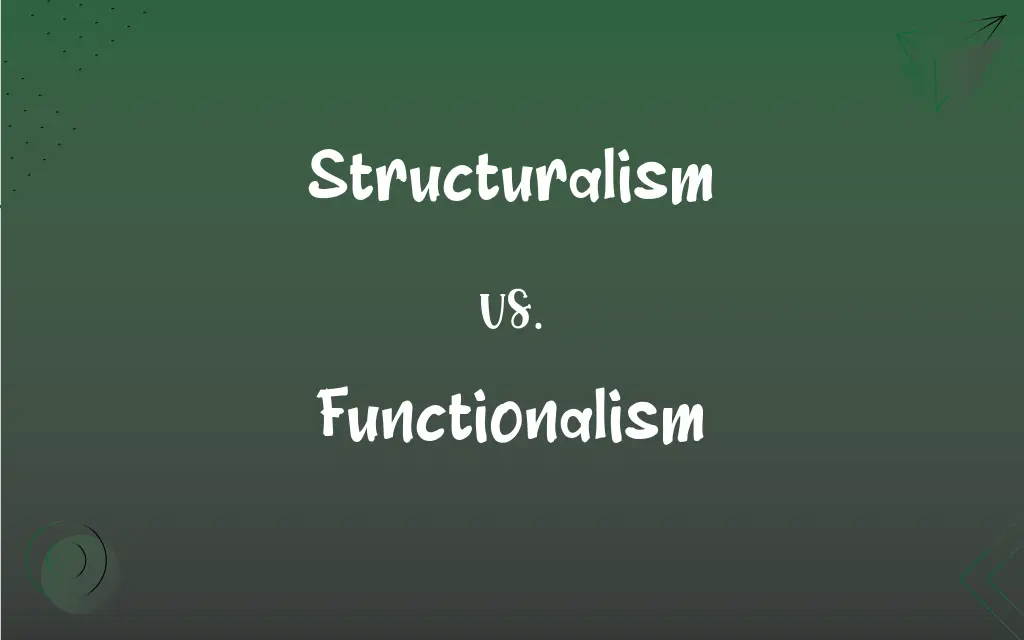Structuralism vs. Functionalism: What's the Difference?
Edited by Janet White || By Harlon Moss || Updated on October 21, 2023
Structuralism examines mental processes' structure, while functionalism focuses on mental processes' purposes and uses.

Key Differences
Structuralism, rooted in psychology, emphasizes understanding the mental processes' intricate structures. On the other hand, functionalism takes a step further by studying the purpose and use of these mental processes. Both theories stem from attempts to explain human thought and behavior, but their perspectives vary markedly.
When delving into structuralism, researchers aim to dissect the mind into its most basic elements. It's analogous to breaking down a machine into its constituent parts to comprehend its workings. In contrast, functionalism doesn’t just stop at understanding the parts but explores why the mind operates the way it does, focusing on its role in adaptation and survival.
Founded by Edward Titchener, structuralism adopts introspection as its primary methodology. By analyzing conscious experiences, Titchener believed one could isolate individual mental events. However, functionalism, influenced by thinkers like William James, argues that mental processes have evolutionary roots. Therefore, understanding their functionality provides insight into human behavior.
The debate between structuralism and functionalism isn't merely academic. It underscores the differing approaches psychologists can take when investigating the mind. While structuralism provides a foundation by categorizing mental events, functionalism extends this understanding by elucidating the practical implications of these events.
Though these theories hail from the early days of psychology, their influence persists. Structuralism offers a groundwork for understanding mental processes at a granular level. Functionalism, in contrast, aids in realizing the broader applications and implications of these processes in daily life and evolution.
ADVERTISEMENT
Comparison Chart
Focus
Structure of mental processes
Purpose and use of mental processes
Key Proponent
Edward Titchener
William James
Methodology
Introspection
Observational studies
Philosophical Roots
Analysis of consciousness
Adaptation and evolution
Legacy
Laid groundwork for cognitive psychology
Influenced behaviorism and applied psychology
ADVERTISEMENT
Structuralism and Functionalism Definitions
Structuralism
An early school of psychology founded by Titchener.
Structuralism was predominant in the late 19th and early 20th centuries.
Functionalism
An approach influenced by Darwin's evolutionary theory.
Functionalism examines mental processes from an evolutionary standpoint.
Structuralism
Analyzing phenomena to understand constituent parts.
Structuralism breaks down complex processes into simpler components.
Functionalism
A theory opposing structuralism's introspective methods.
Functionalism shifted focus from mental structure to mental function.
Structuralism
A method that studies consciousness by analyzing its basic components.
Through structuralism, he sought to dissect the mind's fundamental elements.
Functionalism
A psychological approach emphasizing mental processes' roles in adaptation.
Functionalism studies how mental activities help individuals adapt to their environment.
Structuralism
A psychological approach focusing on mental structures.
Structuralism emphasizes the systematic study of mental processes.
Functionalism
The study of the purpose and use of consciousness.
Through functionalism, psychologists explore the why behind mental processes.
Structuralism
Theory emphasizing introspective examination of mental experiences.
Structuralism relies heavily on introspective methods for data gathering.
Functionalism
Focuses on how the mind impacts behavior and decision-making.
Functionalism seeks to understand the practical applications of mental processes.
Structuralism
A method of analyzing phenomena, as in anthropology, linguistics, psychology, or literature, chiefly characterized by contrasting the elemental components of the phenomena in a system of binary opposition and examining how the elemental components are combined to make larger units.
Functionalism
The doctrine that the function of an object should determine its design and materials.
FAQs
What's the primary focus of structuralism?
Structuralism concentrates on analyzing the structure of mental processes.
How does functionalism differ in its focus?
Functionalism studies the purpose and use of mental processes.
What methodology did structuralism heavily rely on?
Structuralism extensively used introspection.
How do the two theories view consciousness?
Structuralism dissects consciousness into parts, while functionalism examines its adaptive roles.
Does functionalism negate the findings of structuralism?
No, functionalism builds upon structuralism but shifts the focus to the "why" of mental processes.
Who is a notable figure associated with structuralism?
Edward Titchener is closely linked with structuralism.
Did functionalism or structuralism pave the way for cognitive psychology?
Structuralism laid the groundwork for cognitive psychology.
Why is functionalism tied to evolution?
Functionalism believes mental processes have evolutionary purposes, aiding adaptation.
Which theory has a more practical or applied approach?
Functionalism, with its focus on the utility of mental processes, has a more applied approach.
Which theory is more holistic in its approach?
Functionalism takes a more holistic view by considering the role of mental processes in broader contexts.
Which theory might be more relevant for a behavioral biologist?
Functionalism, with its emphasis on adaptation, would likely resonate more.
Is functionalism still prevalent in contemporary psychology?
Elements of functionalism persist, especially in evolutionary psychology and the study of adaptive behaviors.
How might functionalism view emotions?
Functionalism would study emotions in terms of their adaptive value and impact on behavior.
Who played a significant role in the development of functionalism?
William James is a pivotal figure in functionalism.
How has functionalism influenced modern psychology?
Functionalism has influenced areas like behaviorism and applied psychology.
How might functionalism approach problem-solving behaviors?
Functionalism would study how problem-solving aids in adaptation and survival in various contexts.
What's the key criticism of structuralism?
Critics argue that introspection, central to structuralism, is subjective and unreliable.
Can the two theories coexist?
While they offer different perspectives, both provide valuable insights into understanding the mind.
Does structuralism delve into unconscious processes?
Structuralism mainly focuses on conscious experiences, relying on introspective methods.
Did structuralism have a global influence?
Structuralism mainly influenced European and American psychology during its prime.
About Author
Written by
Harlon MossHarlon is a seasoned quality moderator and accomplished content writer for Difference Wiki. An alumnus of the prestigious University of California, he earned his degree in Computer Science. Leveraging his academic background, Harlon brings a meticulous and informed perspective to his work, ensuring content accuracy and excellence.
Edited by
Janet WhiteJanet White has been an esteemed writer and blogger for Difference Wiki. Holding a Master's degree in Science and Medical Journalism from the prestigious Boston University, she has consistently demonstrated her expertise and passion for her field. When she's not immersed in her work, Janet relishes her time exercising, delving into a good book, and cherishing moments with friends and family.































































